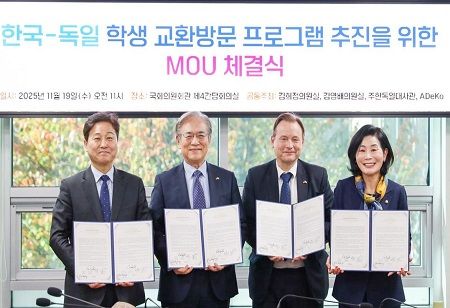- ADeKo signs an MoU with the German Embassy in Seoul to launch a Korea–Germany student exchange program beginning in 2026.
- The initiative will start with 200 students from 10 schools and aims to scale up to 1,000 participants by 2028, strengthening youth-level cultural and educational ties.
- Leaders from both nations highlight the program as a foundation for long-term bilateral cooperation, supporting global citizenship, language learning, and sustained people-to-people engagement.
The Korea Germany Network, also called Alumninetzwerk Deutschland-Korea, or ADeKo, signed an MoU with the Embassy of Germany in Seoul Wednesday to establish a student exchange program to further consolidate educational and cultural ties between the two nations.
The ceremony, held at the National Assembly, was attended by lawmakers Kim Hee-jung and Kim Young-bae, co-chairs of the Korea-Germany Parliamentary Friendship Association; German Ambassador Georg Schmidt; and ADeKo Chairman Kim Hyo-joon.
Under the agreement, exchanges are set to start in 2026 with roughly 200 students from 10 schools participating in weeklong reciprocal visits. The program is expected to grow to 1,000 students by 2028 and may later expand into a semester-based model.
"The direct exposure is vital to creating long-term connections among youth in both countries", Schmidt said. He added that "the experience of a single student often influences whole families and circles of friends", calling the exchange "a foundation for long-term stability in bilateral relations".
Chairman of ADeKo Kim Hyo-joon said the organization will take the lead in coordinating the program's development. "ADeKo will take the lead in planning, coordination, and implementation so the program can settle as a stable and sustainable platform", he said. He added that "our goal is to expand the exchange to around 1,000 participating students within the next few years".
Also Read: 10 Top Scholarships Helping Asian Students Achieve Academic Excellence
According to Lawmaker Kim Hee-jung, the initiative will contribute much to the growth of future generations into global citizens who understand and respect cultures different from their own. The lawmaker underlined that Korea and Germany "share historical experiences and a deep belief in education", which makes youth exchange particularly meaningful.
Rep. Kim Young-bae highlighted that youth-level engagement remains crucial at a time of rapid global change, calling person-to-person exchanges 'one of the most resilient forms of bilateral cooperation'.
While the memorandum of understanding is not legally binding, both sides see it as an important first step toward institutionalized cooperation. Further discussions are planned on the recruitment of teachers, the support of German language education, and administrative procedures that are needed for building a framework of long-term exchanges.

